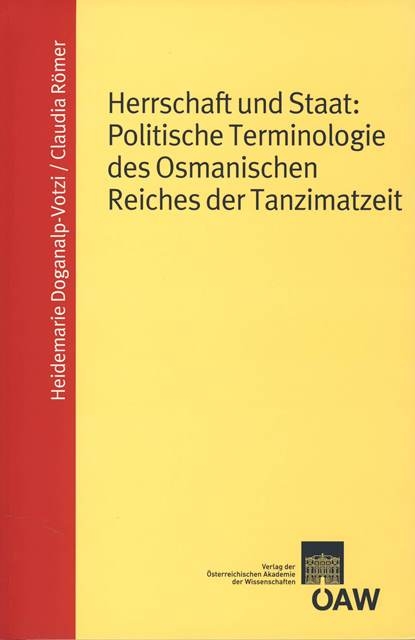
Herrschaft und Staat: Politische Terminologie des Osmanischen Reiches der Tanzimatzeit
Seiten
2009
Verlag der österreichischen Akademie der Wissenschaften
978-3-7001-6101-1 (ISBN)
Verlag der österreichischen Akademie der Wissenschaften
978-3-7001-6101-1 (ISBN)
- Titel nicht im Sortiment
- Artikel merken
Das Buch untersucht die Verbindung zwischen Sprache, Gesellschaft und Geschichte im Osmanischen Reich in Bezug auf den ersten nachhaltigen Einfluss europäischer Konzepte auf einer linguisitischen und kulturellen Grundlage. Die Tanzimatperiode (1840-1870) ist eine Zeit der Reformen, die auf europäischen sozio-politischen Ideen beruhen. Das Osmanische Reich hatte sich auf dem Höhepunkt seiner Macht seinen Nachbarn überlegen gefühlt und so die Entwicklungen, die ein neues Europa geformt haben, bis hinein ins 18. Jh. versäumt (Reformation, Aufklärung, technischer Fortschritt). Spätestens da erkannte die Hohe Pforte, dass das Osmanische Reich im Niedergang begriffen war. Daher bemühte man sich, europäische literarische und wissenschaftliche Werke ins Osmanische zu übersetzen und administrative, gesetzliche und juridische Reformen einzuleiten. Diese Reformen basierten auf europäischen Vorbildern, wobei jedoch neue Wörter und Begriffe nötig waren, um vormals unbekannte Ideen auszudrücken. Diese Dynamik lief unter zweierlei Begleitumständen ab. Die Nationalbewegungen innerhalb des Reiches zwangen die Pforte zu reagieren. Zugleich aber mußte sich das Osmanische Reich auch mit der Einmischung der europäischen Mächte auseinandersetzen. Daher war es eines der ersten muslimischen Länder, die zwischen dem Islam und der europäischen Moderne vermittelten. Das vorliegende Buch zeigt, wie sich dies in der osmanischen Sprache reflektierte, wobei als Quellen neben Zeitungen vor allem die Reformdekrete von 1839 und 1856 sowie die erste osmanische Verfassung von 1876 dienen. Die Untersuchung konzentriert sich darauf, wie und wann neue Wörter für einige wichtige Begriffe eingeführt wurden, z.B. bezüglich Rechtssicherheit, Parlamentarismus, moderne Administration, Freiheit, Gleichheit und nationalstaatliche Ideen.
…
This book investigates, on a linguistic and cultural basis, the connections between language, society and history in the Ottoman Empire with regard to the first long-term impact of European concepts. The Tanzimat period (1840–1870) was a time of reforms based on European socio-political ideas. At the peak of its power, the Ottoman Empire had felt superior to its neighbours, thereby missing the developments forming a new Europe well into the eighteenth century (the Reformation, the Age of the Enlightenment, and technological progress). By then, the Sublime Porte could not help relaise that the Ottoman Empire was in a state of decline. On the one hand, efforts were undertaken to translate European literary and scientific works into Ottoman-Turkish. On the other hand, a period of reforms in the administrative, legal and judicial fields was initiated. These reforms were modelled on European examples. For this purpose, however, new words and notions were needed in order to express ideas hitherto unknown. These dynamic developments within the Ottoman Empire and the Ottoman language took place against a twofold background. The national movements, especially those in South-eastern Europe, forced the Ottoman Empire to react. At the same time, however, the Ottoman Empire also had to deal with the interference of the European powers. As a consequence, the Ottoman Empire was one of the first Muslim countries to mediate between Islam and European modernity. The present book shows how this was reflected in the Ottoman language, the sources being extracts from newspapers and, more importantly, the reform decrees of 1839 and 1856, as well as the first Ottoman constitution of 1876. The investigation focuses on how and when new words for a number of prominent notions were introduced, e.g. the rule of law, parliamentarianism, modern administration, liberty, equality, and the nation-state.
…
This book investigates, on a linguistic and cultural basis, the connections between language, society and history in the Ottoman Empire with regard to the first long-term impact of European concepts. The Tanzimat period (1840–1870) was a time of reforms based on European socio-political ideas. At the peak of its power, the Ottoman Empire had felt superior to its neighbours, thereby missing the developments forming a new Europe well into the eighteenth century (the Reformation, the Age of the Enlightenment, and technological progress). By then, the Sublime Porte could not help relaise that the Ottoman Empire was in a state of decline. On the one hand, efforts were undertaken to translate European literary and scientific works into Ottoman-Turkish. On the other hand, a period of reforms in the administrative, legal and judicial fields was initiated. These reforms were modelled on European examples. For this purpose, however, new words and notions were needed in order to express ideas hitherto unknown. These dynamic developments within the Ottoman Empire and the Ottoman language took place against a twofold background. The national movements, especially those in South-eastern Europe, forced the Ottoman Empire to react. At the same time, however, the Ottoman Empire also had to deal with the interference of the European powers. As a consequence, the Ottoman Empire was one of the first Muslim countries to mediate between Islam and European modernity. The present book shows how this was reflected in the Ottoman language, the sources being extracts from newspapers and, more importantly, the reform decrees of 1839 and 1856, as well as the first Ottoman constitution of 1876. The investigation focuses on how and when new words for a number of prominent notions were introduced, e.g. the rule of law, parliamentarianism, modern administration, liberty, equality, and the nation-state.
| Erscheint lt. Verlag | 22.1.2009 |
|---|---|
| Reihe/Serie | Schriften der Balkan-Kommission, Linguistische Abteilung ; 49 |
| Verlagsort | Wien |
| Sprache | deutsch |
| Maße | 170 x 240 mm |
| Gewicht | 480 g |
| Einbandart | Paperback |
| Themenwelt | Geisteswissenschaften ► Sprach- / Literaturwissenschaft ► Slavistik |
| Geisteswissenschaften ► Sprach- / Literaturwissenschaft ► Sprachwissenschaft | |
| Schlagworte | Balkanstudien • Hardcover, Softcover / Slawische Sprachwissenschaft, Literaturwissenschaft • Osmanisches Reich • politische Terminologie • Slavistik • Tanzimatzeit |
| ISBN-10 | 3-7001-6101-8 / 3700161018 |
| ISBN-13 | 978-3-7001-6101-1 / 9783700161011 |
| Zustand | Neuware |
| Haben Sie eine Frage zum Produkt? |
Mehr entdecken
aus dem Bereich
aus dem Bereich
Ein Lehr- und Arbeitsbuch für Unterricht und Selbststudium
Buch | Softcover (2022)
Buske, H (Verlag)
CHF 54,60
Buch | Softcover (2024)
Lonely Planet Global Limited (Verlag)
CHF 10,45
Sprachen, Konzepte, Praktiken
Buch | Softcover (2019)
Brill | Fink (Verlag)
CHF 109,95


